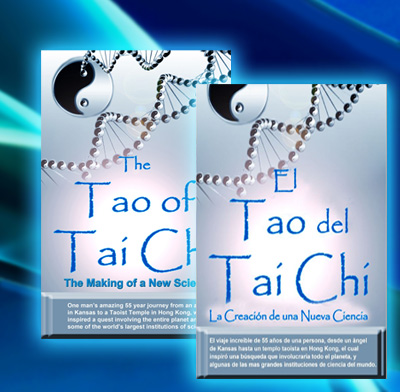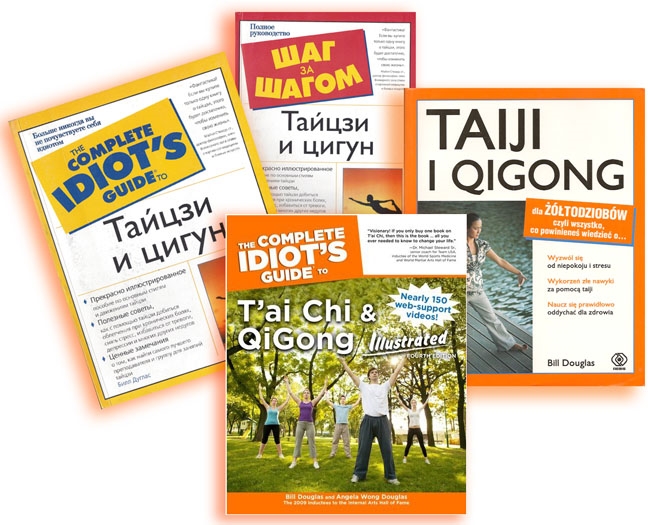breast cancer and Tai Chi & qigong
BREAST CANCER THERAPY (QIGONG -
CHI KUNG).
NIH (National Institutes
of Health)
Effect of Tai Chi Chuan in Breast Cancer
Patients: A Systematic Review and Meta-Analysis
Results: Fifteen articles involving a total of 885 breast
cancer participants were included in this review. Compared
with non-exercised therapy, TCC had a significant effect on
quality of life in breast cancer patients
Click for NIH study
Research on tai chi in
women with breast cancer
In a few small studies,
tai chi was shown to improve heart and lung function,
strength, flexibility, self-esteem, and quality of life in
women who had had breast cancer.
A 2004 study at the Wilmot Cancer Center in Rochester, NY
Researchers from the MD Anderson
Cancer Center at the University of Texas found that practicing
qi gong was linked with decreased depression and increased
quality of life in women who were undergoing radiotherapy for
their breast cancer.
The
findings are important because past research has shown an
association between depression and worse outcomes for cancer
patients.
The new study, published in
the journal Cancer, included 96 Chinese women who had stage 1,
2 or 3 breast cancer and were going to the Fudan University
Shanghai Cancer Center in China. ...
Researchers found that women who did
qi gong experienced a decrease in depressive symptoms by the
end of the study, while women who were in the control group
didn't experience any decrease in symptoms. They also noted
that the women who had the highest scores on the depression
scale were the ones who experienced the greatest benefit --
both in decreased depressive symptoms and improved quality of
life -- from qi gong.
-- Huffington Post, January 28, 2013
BREAST CANCER THERAPY
(TAI CHI).
CANBERRA,
Sept. 16 (Xinhua) -- The traditional Chinese exercise of Tai
Chi helps women who develop persistent arm swelling after
breast cancer surgery, an Australian researcher has found.
An Australian Associated Press report on Friday quoted Neil
Piller of the Flinders Medical Center in Adelaide, South
Australia, as saying that up to 30 percent of breast cancer
patients develop a condition known as lymphoedema after a
mastectomy or partial breast removal.
Breast
cancer. Tai chi has shown potential for improving quality of
life and functional capacity (the physical ability to carry
out normal daily activities, such as work or exercise) in
women suffering from breast cancer or the side effects of
breast cancer treatment. For example, a 2008 study at
the University of Rochester, published in Medicine and Sport
Science, found that quality of life and functional capacity
(including aerobic capacity, muscular strength, and
flexibility) improved in women with breast cancer who did 12
weeks of tai chi, while declining in a control group that
received only supportive therapy.
Harvard Medical School's Health Publications,
May, 2009
Tai
Chi Chuan (TCC) may be a useful form of aerobic exercise
capable of improving inflammatory profiles and cardiovascular
function (CF) among breast cancer survivors.
University of Rochester School of Medicine, Rochester, NY.
Wake Forest University, Winston-Salem, NC. University of North
Carolina Greensboro, Greensboro, NC.
CONCLUSION: These data suggest that TCC may improve
inflammatory profiles and that these changes may be associated
with changes in CF. More definitive phase III randomized
clinical trials are needed to confirm these results. Funded by
NCI grant 1R25CA102618 and Sally Schindel Cone Fund
The Tai Chi
group demonstrated significant improvements in Quality of
Life, while the Psychosocial Support group reported declines
in Quality of Life. Additionally, the Tai Chi group exhibited
improvements in self-esteem, while the Psychosocial Support
group reported declines in self-esteem.
-- Support Care Cancer, 12, 871-6
This study examined the effects of
qi-gong therapy on complete blood counts in breast cancer
patients treated with chemotherapy. The experimental group
received a 21-day qi-gong therapy. Significant differences in
white blood cells, platelets and hemoglobin over the 3-week
therapy suggested that qi-gong therapy may decrease leukopenia
in breast cancer patients treated with chemotherapy.
-- Cancer Nursing, 29, 149-55
Tai Chi Chuan, health-related
quality of life and self-esteem: a randomized trial with
breast cancer survivors. Mustian KM, Katula JA, Gill
DL, Roscoe JA, Lang D, Murphy K.Behavioral Medicine Unit,
Department of Radiation Oncology, James P. Wilmot Cancer
Center, University of Rochester School of Medicine and
Dentistry, 601 Elmwood Avenue, Box 704, Rochester, NY 14642,
USA. Karen_Mustian@urmc.rochester.edu
GOALS: Health-related quality of life
(HRQL) and self-esteem are often diminished among women
diagnosed and treated for breast cancer. Tai Chi is a moderate
form of exercise that may be an effective therapy for
improving HRQL and self-esteem among these women. We sought to
compare the efficacy of Tai Chi Chuan (TCC) and psychosocial
support (PST) for improving HRQL and self-esteem among breast
cancer survivors. PATIENTS AND METHODS: A group of 21 women
diagnosed with breast cancer, who had completed treatment
within the last 30 months were randomized to receive 12 weeks
of TCC or PST. Participants in both groups met three times a
week for 60 minutes. HRQL and self-esteem were assessed at
baseline, 6 weeks, and 12 weeks. RESULTS: The TCC group
demonstrated significant improvements in HRQL, while the PST
group reported declines in HRQL, with the differences between
the two groups approaching significance at week 12.
Additionally, the TCC group exhibited improvements in
self-esteem, while the PST group reported declines in
self-esteem, with the differences between groups reaching
statistical significance at week 12. These findings, coupled
with a visual inspection of the raw change scores, support the
plausibility of a dose-response relationship concerning Tai
Chi.
CONCLUSIONS: In this pilot
investigation, the TCC group exhibited improvements in HRQL
and self-esteem from baseline to 6 and 12 weeks, while the
support group exhibited declines.
FIND MUCH MORE RESEARCH AT THE "QIGONG INSTITUTE DATABASE"
Since 1984, collecting breaking medical/science research on
Qigong, Tai Chi, Yoga, and Mind-Body Education
Click here
for Qigong Institute Database...
* NOTE: World Tai Chi & Qigong Day advises
consulting your physician before beginning any new exercise,
herbal, diet, or health program. The research listed here is
meant to stimulate a discussion between you and your
physician, health insurance carrier, etc., not as medical
advise. Research and comments provided here are hoped to
stimulate a more robust discussion of powerful natural
mind/body health tools. Popular media, health media, and
government must increase attention to stunning emerging
research, including the UCLA study indicating Tai Chi
participants enjoyed a 50% increase in immune system
resistance to viral infection.
- To learn more about tai chi & qigong medical research,
see the below book,
"the complete idiot's guide to tai chi & qigong,", and also
"Harvard Medical School Guide to Tai Chi," and
"The way of qigong: the art and science of chinese energy healing."
Click to purchase this acclaimed best-selling Tai Chi book, with nearly 150 web-video support videos for the detailed text/illustration instruction as a "gift of health" for loved ones.
A new paradigm in multi-media educational books.
"Visionary! If you only buy one book on T'ai Chi, then this
is the book. This book is all you ever needed to know to
change your life. I have taught T'ai Chi for several decades
myself, yet I have now read Bill's book from cover to cover
seven times, and still get something new from it each time."
– Dr. Michael Steward Sr., D.MA, Ph.D., MA, Senior
Coach for Team USA, Inductee of the World Sports Medicine and
World Martial Arts Hall of Fame
"Sometimes Chinese
culture can be difficult to explain. Sifu Bill Douglas
successfully uses American culture to explain the art of T'ai
Chi Chuan. He simplifies difficult concepts, making them
easier to understand. This book takes the best parts of T'ai
Chi and makes them understandable [to Westerners] without
requiring a grounding in Chinese culture and history."
– Sifu Yijiao Hong, USA All-Tai Chi Grand Champion and USA
Team member; Certified International Coach and Judge,
International Wushu Federation
"Douglas has
achieved for QiGong what Apple did for the computer. He's
brought it to the people … great place to start for beginners.
… Teachers may also find this an excellent manual 'on how to
explain these concepts to the general public…'"
– R.
Poccia,
"The Tao of Tai Chi: The Making of a New Science" (now available in both English and Spanish))

Harvard's Dr. Peter Wayne discusses Tai Chi, Qigong and Bio-Energy with Neuro-biologist, Dr. Richard Hammerschlag,
with WORLD TAI CHI & QIGONG DAY ONLINE SUMMIT HOSTS
World Tai Chi & Qigong Day's series of Official ONLINE
SUMMITS, have brought some of the top minds in Tai Chi, Qigong,
and cutting edge scientists researching Mind-Body practices.
World Tai Chi & Qigong Day's global health education work was
recognized on page 25 of "The Harvard Medical School Guide to
Tai Chi" ...
A reflection of how successful the invasion
has been is World Tai Chi Day, organized by Bill Douglas. One of
the purposes of this day is ‘to bring together people across
racial, economic, religious, and geo-political boundaries, to
join together for the purpose of health and healing, providing
an example to the world.' Millions of people around the world –
65 nations participated in 2011 – gather one day each year to
celebrate the health and healing benefits of Tai Chi and Qigong.
— The Harvard Medical School Guide to Tai Chi (page 25)
Harvard Medical School Researchers Launch 'Tai Chi as Therapy' Lecture to Commemorate World Tai Chi Day
The new Harvard Medical School Guide to Tai Chi is a powerful
reference book for all tai chi and qigong advocates, teachers,
etc. The Harvard Guide cites WorldTaiChiDay.org's work in
expanding global awareness of tai chi and qigong!
Our
efforts have exposed over ONE BILLION potential viewers/readers
of mass media to Tai Chi and Qigong and its myriad health
benefits, via our annual WTCQD worldwide events.
